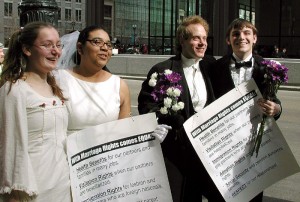My On-the-Fly Stance on Same-Sex Marriage
20 Jun 2013 8 Comments
in Bible, Justice, Politics, Theology
While sharing discussion on various online media about the recent news of Exodus International’s closure, I was asked to share my “stance on same-sex marriage.” I’m actually in the middle of a longer-form writing project focused on this; however, I figured that I might as well share the gist of my thoughts on the matter here in the mean time.
So, I’ve compiled my contributions to today’s discussion to respond still somewhat on-the-fly about my approach to the topic of same-sex marriage. This is partly observational with some forecasting as well as partly prescriptive with an explicit focus on conditions in America and an attempt to root my response in a close reading of scripture. Here are a few of the main points in the observation and forecasting category:
- Same-sex marriage will be legalized across America.
- Most Americans regardless of faith background tacitly accept a naive distinction between politics, sociology, and ethics that critically complicates how we make decisions about marriage since that state of affairs possesses a public, community-located, and private dimension to its existence.
- American Christians are ill-equipped to make good, assertive decisions about the rise of political, sociological, and ethical support for same-sex marriage in the broader culture due to the above taken together with the fact that American Christians possess a weak sexual ethic in general–this is true for both conservative / evangelical as well as progressive / liberal Christians as thoroughly evidenced by the statistical insignificance of faith background on sexual activity.
- In an attempt to prevent the acceptance of same-sex marriage in the broader culture, American evangelical Christians have made an ineffective decision to focus on the political and sociological arenas of activity rather than strengthen their sexual ethic and work outwards by way of influencing individual people. This is failing as everyone in the broader culture–including heterosexually oriented Christians–are adopting an ethic that is progressively less robustly informed by scripture.
- Even if American evangelical Christians succeeded against all odds to prevent the political acceptance of same-sex marriage, this would not affect people in a substantial way with regard to their behavior; both same-sex and opposite-sex attracted people will continue to behave in conflict with the sexual ethic that American evangelical Christians have espoused regardless of the political climate due to the entrenched, social acceptance of a sexual ethic based on things like freedom of personal choice, consent, and so forth with virtually no reference to scripture as a source of substantive, ethical information.
Here are some prescriptions based on the above. For the sake of being concise, I’ve included myself in the use of the term “evangelical Christians,” although I have some reservations about this phrase given its loaded connotations. When I’m not as concerned about being so concise, I often describe myself as a Jewish follower of Jesus with an orthodox, constructive framework. Right then:
- American Christians should abandon the attempt to prevent same-sex acceptance through political and sociological means, refocusing their efforts on developing a more robust sexual ethic that is actually compellingly for everyone regardless of what the political or sociological climate may be. Christians have done this in the past and can do it again; when we don’t do this, we functionally illustrate our lack of belief in the power of the gospel.
- American Christians should recognize the difference between marriage as a state of affairs created, defined, and protected by a given nation-state versus marriage as a state of affairs created, defined, and protected by the God of scripture; we already do this to a certain extent by expecting people who want to get married to both a) get a marriage license from the nation-state to effect a political union and b) partake in a wedding ceremony with the church as God’s agent for effecting a spiritual union.
- American evangelical Christians like myself should advocate for sexual activity limited to chastity in singleness or else heterosexual marriage from an ethical perspective regardless of the political or sociological climate.
- Evangelical Christians in representative democracies like me should advocate for what is in the best interest of the nation-state from a political perspective; based on all the data I’ve analyzed up to this point, this concretely means either a) advocating for the legalization of same-sex marriage, b) advocating for identical rights for civil unions that are equally open to same-sex couples as opposite-sex couples, c) advocating for the dissolution of all legally conferred benefits for anyone that the nation-state recognizes as being married while giving up those benefits in the mean time, e.g. through financial support to the same-sex community.
- American evangelical Christians like me should basically ignore a direct attempt to accomplish sociological change in the broader culture through any route other than the persuasive expansion of our own sexual ethic provided that we succeed in fixing it; of course, this will likely be a recursive process since people change over time and effectively communicating the gospel requires fresh articulation and demonstration with those changes.
- Evangelical Christians like me should deal squarely with the litany of hurt suffered by the same-sex attracted community specifically by Christians and take protracted, embracing, patient, humble, and courageous action to repair that damage indefinitely into the future with real people.







